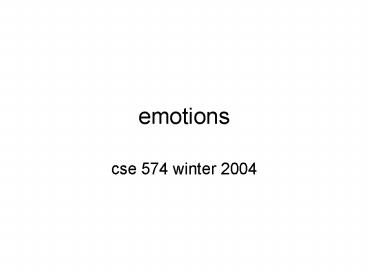emotions PowerPoint PPT Presentation
1 / 12
Title: emotions
1
emotions
- cse 574 winter 2004
2
emotions
- cse 574 winter 2004
3
affective computing
- R.W. Picard, Affective Computing
- limbic / cortical tangle
- lack of emotion inefficient decision making
(theorem prover run wild?) (Damasio) - human/human conventions hold for human/computer
interaction (Nass) - affective pattern recognition
- limbic system inspiration for backpropagation
- applications
- teaching
- environments
- communication tools
- entertainment
- bad faith?
4
Recognizing Emotions
- M. Dailey, G. Cottrell, R. Adlophs, A six-unit
network is all you need to discover happiness - Input 29x36 grid of wavelets transformation
of image to a sum of period signals (frequency
domain) - Principle component analysis to reduce
dimensionality - Classification by 6-unit neural network
- Biologically plausible
5
(No Transcript)
6
(No Transcript)
7
(No Transcript)
8
Purposeful Emotions
- J.D. Valaqsquez, When robots weep emotional
memories decision-making, AAAI 1998. - Emotions as non-conscious biasing mechanism
somatic marker of past experience functions
as alarm or incentive (A. Damasio, Descartes
Error) - drives impels agent into action
- emotion system
- anger, fear, distress, happiness, disgust,
surprise mixes - triggered by releasers
- can learn associations between stimuli emotion
(e.g. image of pea soup disgust) - behavior system set of self-interested
behaviors (play, approach) - triggered/inhibited by drives, emotions, each
other
9
coco
10
kismet
11
(No Transcript)
12
Big Picture
- What are the components of computational theory
of human intelligence? What kinds of
applications need to consider each? - Which are universal to any kind of intelligent
organism or artifact? Which are unique to social
beings? To human beings? - What are appropriate ways to model these
phenomena? Are the models psychologically
plausible descriptions of - How we think?
- How we think about others?
- part 1 discourse understanding
- speech act theory
- beliefs about beliefs and goal
- planning utterances
- interpreting utterances
- the structure of discourse
- reinforcement learning in discourse analysis
- part 2 behavior recognition
- technical foundations from Markov models to
Dynamic Bayes Nets - modeling events with structure and continuous
time - learning user models
- modeling user errors and emotions
- applications
- part 3 creativity emotion
- theories of creativity
- computers that create art and music
- emotional computers

